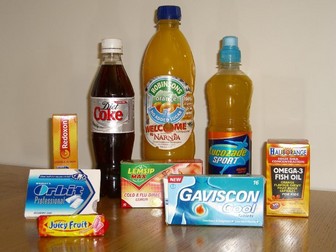Eleven legislators in New Mexico have asked US President GW Bush, the FDA chief Von Eschenbach and the US Health Secretary Michael Leavitt, to override and cancel the previous approval of Aspartame, a controversial artificial sweetener that was approved over the resistance of FDA scientists, as a result of the political intervention of now Defense Secretary Donald Rumsfeld.
In their letter, the legislators reason that the sweetener's FDA approval should be rescinded, citing the tendency of aspartame to be metabolized into methanol and formaldehyde, both highly toxic to humans. Additionally, when Aspartame is heated, it turns into a brain tumor-causing agent called diketopiperazine.

A selection of products containing aspartame - image credit: Roger Williams' website
The letter from the New Mexico legislators cites a statement from 46 members of the United Kingdom Parliament, dated January 30, 2006 and drafted by Roger Williams, the Member of Parliament from Radnorshire, Wales, stating:
That this House expresses deep concern over the numerous independent toxicological studies and thousands of subjective reports attesting to the toxic effects of the artificial sweetener aspartame on human health; notes that aspartame, once patented as a biochemical warfare agent, is the synthetically produced methyl ester of a dipeptide which is readily broken down in the gut to release methanol; further notes that in naturally occurring foodstuff methanol is either not released into the body or present together with natural defence mechanisms that mitigate its toxic effects; recognises that methanol is a well known poison and is further converted into formaldehyde, a class A carcinogen according to the World Health Organisation's International Agency for Research on Cancer; accepts that severe health concerns occur from the gradual accumulation of formaldehyde in the body which cannot be excreted and that further research has shown that long term low level exposure to formaldehyde induces leukaemia and nasopharyngeal cancer in humans; acknowledges that of the 166 studies conducted on aspartame's safety deemed relevant to humans, 92 per cent. of independently sponsored studies identified one or more problems with aspartame's safety whereas industry-sponsored studies found unanimously in favour of aspartame's safety; and urges the Government to abide by the precautionary principle and make use of Statutes 13 and 16 of the 1990 Food Safety Act to remove aspartame from the permitted list of additives on the UK market.
- - -
The New Mexico legislators pressed Bush to pay no heed to corporate objections and allegations that their products are "safe."
Their letter concluded by stating that: "It is unacceptable that a chemical considered in 1979 by the Pentagon for a biochemical warfare agent two years later be approved for adding to 6000 USA food products and more than 500 medications, including children's vitamins and aspirin."
In addition to Senator Gerald Ortiz y Pino, who drafted the letter, the following senators and representatives also signed:
Senator John Pinto, Chairman, Indian and Cultural Affairs
Senator Carlos Cisneros, Chairman Conservation Committee
Senator Leonard Tsosie, Member, Finance Committee
Representative Rick Miera, Chair, House Education Committee
Representative Ray Begaye, Vice Chair, Agriculture and Water Resources
Representative Bobby Gonzales, Vice Chair, House Taxation and Revenue Committee
Representative Sheryl Williams Stapleton, House Majority Whip
Representative Harriet Ruiz Chair, Enrolling and Engrossing
Representative Richard Vigil, Vice Chair, House Education Committee
Representative W.C. Williams, Member, House Education Committee
Stephen Fox at 505-983-2002 has more details.
A recent Italian study by the Ramazzini Institute of Oncology raised serious doubts about the sweetener. The study looked at the effects of aspartame on 1,800 male and female rats, using six different control doses. Aspartame administered at varying levels in feed caused a statistically significant increase of lymphomas and leukemia, malignant tumors of the kidneys in female rats and malignant tumors of peripheral and cranial nerves in male rats. Such tumors occurred even in doses well below the acceptable daily intake recommended as ‘safe’ by regulatory authorities in the EU and the US. Pressure by industry led to a European Food Safety Agency statement that consumers should not be worried.
Meanwhile, problems with aspartame are not going away. They are kept submerged by the FDA and other health authorities, which have a policy of not accepting "aspartame side effect" as a possible cause for the trouble many of the consumers of the sweetener are experiencing. The FDA's own list of aspartame side effects was removed from their site early in the game.
Industry profits clearly trump consumer health.